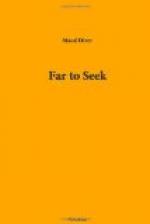And, in justice to Dyan Singh, it should be added that there was more than Aruna in his mind. There was India—increasingly at the mercy of Chandranath and his kind. The very blindness of his earlier obsession had intensified the effect of his awakening. Roy’s devoted daring, his grandfather’s mellow wisdom, had worked in his fiery soul more profoundly than they knew: and his act of revenge was also, in his eyes, an act of expiation. At the bidding of Chandranath, or another, he would unhesitatingly have flung a bomb at the Commissioner of Delhi—the sane, strong man whose words and bearing had so impressed him on the few occasions they had met at the Residency. By what law of God or man, then, should he hesitate to grind the head of this snake under his heel?
One-handed though he was, he would not strike from behind. The son of a jackal should know who struck him. He should taste fear, before he tasted death. And then—the Lake, that would never give up its secret or its dead. Siri Chandranath would disappear from his world, like a stone flung into a river; and India would be a cleaner place without him.
He knew himself hampered, if it came to a struggle. But—tcha! the man was a coward. Let the gods but deliver his victim into that one purposeful hand of his—and the end was sure.
Near the Palace, he deserted Bijli, Son of Lightning; tethered him securely and spoke a few words in his ear, while the devoted creature nuzzled against him, as who should say, ’What need of speech between me and thee’? Then—following Roy’s directions—he made his way cautiously up the hillside, where the arch showed clear in the moon. If Chandranath had been injured or stupefied, he would probably not have gone far.
His surmise proved correct. His stealthy approach well-timed. The guardian gods of Amber, it seemed, were on his side. For there, on the fallen slab, crouched a shadow, bowed forward; its head in its hands.
“Must have been stunned,” he thought. Patently the gods were with him. Had he been an Englishman, the man’s hurt would probably have baulked him of his purpose. But Dyan Singh, Rajput, was not hampered by the sportman’s code of morals. He was frankly out to kill. His brain worked swiftly, instinctively: and swift action followed....
Out of the sheltering shadow he leapt, as the cheetah leaps on its prey: the long knife gripped securely in his teeth. Before Chandranath came to his senses, the steel-spring grasp was on his throat, stifling the yell of terror at Roy’s supposed return....
The tussle was short and silent. Within three minutes Dyan had his man down; arms and body pinioned between his powerful knees, that his one available hand might be free to strike. Then, in a low fierce rush, he spoke: “Yes—it is I—Dyan Singh. You told me often—strike, for the Mother. ‘Who kills the body kills naught.’ I strike for the Mother now.”




